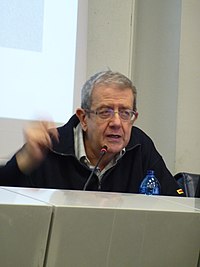Lucio Russo
Lucio Russo | |
|---|---|
 Lucio Russo in 2014 | |
| Born | 22 November 1944 |
| Nationality | Italian |
| Scientific career | |
| Fields | Physics Mathematics History of science |
| Institutions | University of Rome Tor Vergata |
Lucio Russo (born 22 November 1944) is an Italian physicist, mathematician and historian of science. Born in Venice, he teaches at the Mathematics Department of the University of Rome Tor Vergata.
Among his main areas of interest are Gibbs measure of the Ising model, percolation theory,[1] and finite Bernoulli schemes, within which he proved an approximate version of the classical Kolmogorov's zero–one law.[2]
In the history of science, he has reconstructed some contributions of the Hellenistic astronomer Hipparchus, through the analysis of his surviving works, and the proof of heliocentrism attributed by Plutarch to Seleucus of Seleucia and studied the history of theories of tides,[3] from the Hellenistic to modern age.
Books
The Forgotten Revolution
In The Forgotten Revolution: How Science Was Born in 300 BC and Why It Had to Be Reborn (Italian: La rivoluzione dimenticata), Russo promotes the belief that Hellenistic science in the period 320–144 BC reached heights not achieved by
According to Russo, Hellenistic scientists were not simply forerunners, but actually achieved scientific results of high importance, in the fields of "mathematics, solid and fluid mechanics, optics, astronomy, anatomy, physiology, scientific medicine",
Hellenistic science was focused on the city of
He also concludes that the 17th-century scientific revolution in Europe was due in large part to the recovery of Hellenistic science.[5] The Forgotten Revolution has received mixed reviews, praising Russo's enthusiasm but noting that his conclusions outreach his sources.[6][7][8][9]
L'America dimenticata
In L'America dimenticata, Russo suggests that the Americas
Russo notes paintings dating to the
With the collapse of the Hellenistic world under the attacks of the Romans around the middle of the 2nd century BC (specifically, the destruction of Corinth and Carthage in 146 BC and the expulsion of the scientific elite from Alexandria in 145 BC), these geographic notions were lost. Later Ptolemy incorrectly identified the Blessed Islands with the Canaries and since it was known that the Blessed Islands were at the antipodes relative to the eastern part of China, Ptolemy made ends meet by erroneously enlarging the longitude of all known places, and shrinking the width of a degree of longitude (500 instead of 700 stadia).
With this correction Lucio Russo manages[
See also
- Antikythera mechanism, a Hellenistic astronomical computer, which, according to Russo, is a proof of the high level of knowledge in science and technology reached during Hellenism
References
- ^ Geoffrey R. Grimmett, "The Work of Lucio Russo on Percolation","Mathematics and Mechanics of Complex Systems", vol. 4, N° 3–4, pp. 199–211 http://msp.org/memocs/2016/4-3/p02.xhtml
- ^ M. Talegrand "On Russo's approximate zero-one law", "Annals of Probability", 22, (1994), 1576–1587
- ISBN 88-07-10349-4.
- ^ a b Graffi, Sandro, review of La rivoluzione dimenticata, Notices Amer. Math. Soc., vol. 45, no. 5, May 1998.[1]
- ISBN 978-3-540-20396-4.
- ^ Michael Rowan-Robinson, "Praising Alexandrians to excess." Review of The Forgotten Revolution, Physics World vol. 17, no. 4 (April 2004).
- ^ Gary B. Magee, Review of The Forgotten Revolution, Economic Record, 80 (2004): 475–476.[2]
- ^ Samuel S. Kutler, Read This! The Mathematical Association of America Online book review column (20 September 2004).[3]
- ^ Mott Greene, "The birth of modern science?" Review of The Forgotten Revolution, Nature 430 (5 August 2004): 614.
- ISBN 978-88-6184-320-2 [4]
- ^ Plinio, Naturalis Historia, II, 247
